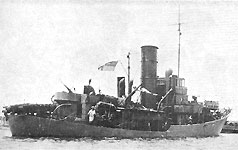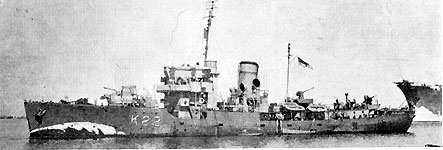The loss of warships in the Mediterranean in general, and in Crete, Malta and Tobruk in particular, had sapped the destroyer strength of the Fleet, leaving serious gaps that had to be filled. The search for likely vessels to fill these gaps led to the Antarctic, where a flotilla of Whale-catchers was found and requisitioned.
It was in fact, from these vessels that the basic design for the wartime corvette was adapted. The latter had developed into ships of around 880 tons, while whale-catchers only tipped the scales at 300 tons; nevertheless, in the role of escort and convoy, they filled the gaps left by 1,200-ton destroyers.
 |
 |
|
| Anything less like a British warship it would be hard to imagine than HMS Cocker. She lay in Tobruk harbour, Cocker an unlikely ship in unnatural waters, far from home. Even her saucy name was unreal, for she had been launched in the 1930s as the more prosaic Kos 19 and had served her peacetime masters well down south, in the most relentless of oceans, doing the toughest and bloodiest of jobs, killing the Great Blue Whale. |
 |
| HMS Cocker a requisitioned peacetime whaler |
|
Anything less like a British warship it would be hard to imagine than HMS Cocker. She lay in Tobruk harbour, Cocker an unlikely ship in unnatural waters, far from home. Even her saucy name was unreal, for she had been launched in the 1930s as the more prosaic Kos 19 and had served her peacetime masters well down south, in the most relentless of oceans, doing the toughest and bloodiest of jobs, killing the Great Blue Whale.
Now here she was, on this June day in 1942, lolling in warm waters, renamed and fitted out with the all the paraphernalia of war, guns, Asdic and depth-charges. Requisitioned only a year before, Cocker like others of her kind, had been brought up from the bottom of the world for service in the Royal Navy as an anti-submarine vessel in the Mediterranean.
On this occasion, as on many previously, Cocker slipped out of Tobruk harbour just before dark to carry out the necessary Asdic sweep of the harbour approaches prior to the arrival of a single-funneled freighter, 'Hanna Moller,. Once she appeared, Cocker and her infinitely more imposing companion ship, the naval corvette HMS Gloxinia- nearly three times as big - would take up station and, as fast as the freighter's tired old engines would allow, they would steam down to Alexandria.
 |
 |
| HMS Gloxina a 'Flower Class' Corvette |
|
This time, however, there were snags. The wayward freighter did not appear at the appointed time, so Cocker swept and re-swept, probing with her Asdic finger for any sign of the underwater enemy, whose habit was to sit quietly outside the harbours for just such a situation as this.
The crew, still at leaving stations, began to get irritable when the CO showed no sign of setting the watch, which would have allowed the bulk of the men to go below.
It was quite dark. Tiring of the constant pressure and danger of crossing and re-crossing courses with our big sister in the blackness, we lay to and carried out a 360-degree sweep. The air was like velvet, the ship blacked out, yet all were aware of the urgency. Didn't this crazy merchantman realise that by dawn we should be well beyond the German dive-bomber range?
Apparently not! We cursed her, the 'slab-sided bastard', for the longer we waited for her to appear, the more likely we were to have Stukas with our breakfast.
Then: 'Captain Sir - vessel passing through the boom.' A sharp command, our telegraphs to the engine-room jangled, and we leapt to life. Much more to our surprise, we took up station on the freighter's port quarter - her seaward side. Our more usual - and, it was thought, safer side - was the shore side when escorting so large a ship, a position which, as the voyage progressed, took us comfortably along under the cliffs. But this station had been pinched by 'Gloxinina' pushing us out into the fully exposed sea-ward side of this miniature convoy.
At last the port watch was set, and the comforting vibrations of our engines, at a modest 'seven O' revolutions, were taking us back to our home base.
I was relieved at midnight. Savouring the now cool air, I went aft, where, following instructions that all off-watch personnel must sleep on deck whilst in this danger area. I had brought my camp bed up from below.
Having first prepared my bed, I stood eating a doorstep of a third-grade salmon sandwich, which I had made from the leftovers of our last meal, before getting my head down to the pure bliss of, at most , three hours sleep.
The jangling alarm-bells jerked me back to life! As if driven by some monumental sledgehammer, an enemy torpedo rammed itself into the very vitals of the Cocker! Instantly our ship and home was no longer either. She seemed to disintegrate, almost dissolve, into the sea.
A second explosion followed, probably the boilers going up, and by the light of flickering flames it was obvious that she had been blown in two, collapsing her at about midship-point into a mass of rending metal.
The stern still motivated by the revolving propeller, seemed now to be crushing forwards and downwards onto the rapidly sinking bow section. There were noises - grinding metal, rushing water and steam rushing out of fractured pipes, bulkheads collapsing - and the agonised cries of trapped shipmates.
The stern began to rise clear of the water as it did so the activating arm of the ship's whistle on the funnel dropped forward and there began a long drawn-out wail until she died.
I clambered up the canting deck to the stern rail, and climbed over the rail onto what normally be the vertical plates of the transome, now nearly horizontal.
There, to my horror, I saw the propeller still furiously turning at 'seven O' revolutions - so that was what seventy revolutions looked like!
My racing thoughts were now playing tricks; in the midst of all this chaos and din, I recalled in absolute detail the day when, as a boy , willfully playing in a friend's farmyard with a chaff-cutting machine, I had accidentally cut the top off of another boy's thumb. I wondered if I was now to be chaff for these great revolving blades.
Although I had seen similar disasters overtake a dozen or so other ships, I could not believe that this had actually happened to us. but the noise was real and so was the floatsam now swirling past - men in the water gasping with shock and immersion in waster and crude oil. My brain cleared, I only had seconds to get away, not only from the propeller blades but from the sinking depth-charges. We carried some twenty in the racks and at least two would have been primed and ready, which meant that, when the mangled ship had sunk to the required depth, the whole lot would blow up.
In a frenzy I stripped off all my top gear, but a navy-blue rollnecked pullover, recently arrived from home, defied all my efforts to get it over my head.
Nor could I swim a yard with it on. There was nothing for it but to cut it off, which I did blessing the fact that I had a jackknife on a lanyard around my middle and wondering at the same time just what my sister would have said seeing her knitted labour of love being cut to ribbons. Then I swam as far as I could to get away from the suction of the ship and the slowly sinking depth charges.
It was scarcely minutes since the torpedo had struck, but it seemed like a lifetime. In the dark I could hear men talking in the sea quite close to me. I eased my swimming pace and looked back at the remains of the ship, now bolt upright in the water, with the propeller still flapping round. She began to slide, accompanied by the never-to-be-forgotten death sounds of a ship broken and doomed.
Bulkheads were crashing, great bubbles of air came vomiting up to the surface and the nudity of those parts of a ship normally not seen when in dry dock was as starkly shocking as one's first view of female nudity. Above all this cacophony of sound, I heard a voice call out in agony. 'I can't swim' ... and a quite callous and matter-of-fact voice from another direction answered, 'You've left it bloody late to learn, chum.'
Cocker vanished in a welter of volcanic eruptions, leaving a sudden heavy silence, and for those of us left in the sea began the soul-destroying task of finding out who of the ship's company was left.
The crude oil was warm and smooth to the touch, but it tasted vile - choking coughs in the darkness began to indicate the presence of survivors. There seemed at first to be a fair number of us in the water, but sound at sea-level can be deceptive. Calls of men to their mates and shouts of others telling of what wreckage they were hanging on to confused the air; it seemed the best there was on offer was half a Carley float.
|